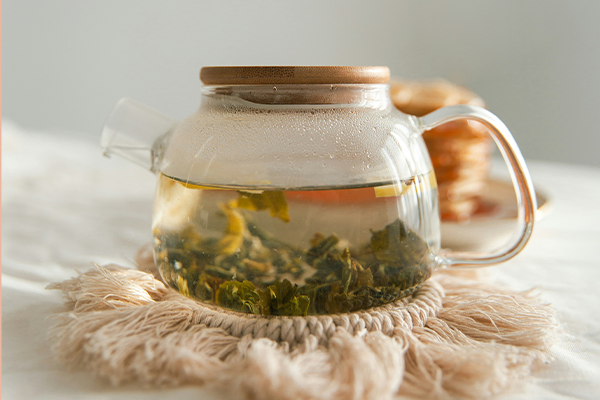15% off £25 or 20% off £35
Code:BASKET
Does green tea help you lose weight?

Drinking 2-3 cups of green tea can help you lose weight. We explore the science behind green tea and weight loss, as well as tips on how much to drink and how it compares with other teas.
Summary
1What is green tea?
Let’s start with the basics. Green tea is, unsurprisingly, green in colour and, surprisingly, made from the same plant as our beloved black tea – the…
2Green tea weight loss claims
Let’s explore some of the many green tea benefits for weight loss. It’s what’s inside that counts: fat-burning compounds. Green tea is naturally rich…
3How many cups of green tea to lose weight?
Opinions vary on this subject, with some studies suggesting you only need to drink 1 cup a day, while others say that you should drink between 3-5…
We’re a nation of tea drinkers, there’s no doubt about it, so it’s not surprising that a lot of us have embraced green tea with open arms and empty mugs!
Some people simply enjoy the delicate, soothing flavour, while others claim it helps them to lose weight. But is there actually any connection between green tea and weight loss?
In this guide we want to explore the link between green tea and weight loss and help you discover if it could worth brewing a pot of the green stuff for yourself!
What is green tea?
Let’s start with the basics. Green tea is, unsurprisingly, green in colour and, surprisingly, made from the same plant as our beloved black tea – the Camellia Sinensis. The difference between them lies in the way they are processed. Green tea isn’t actually processed at all, it’s black tea that goes through the fermentation process, which changes the colour and the flavour.1
Green tea weight loss claims
Green tea is healthy – full stop. You can’t really go wrong with leaves and water! However, it goes deeper than that, green tea is considered one of the healthiest drinks on the planet. This is because it is teaming with antioxidants and other helpful plant compounds that have tons of potential benefits for our health – with weight loss being just one of them.

How to lose weight with green tea
Let’s explore some of the many green tea benefits for weight loss. It’s what’s inside that counts: fat-burning compounds. Green tea is naturally rich in some really beneficial compounds for our bodies, the main two being:
- Caffeine
- Antioxidants
A lot of us rely of caffeine to perk us up in the mornings and help us feel ready to tackle the day. And while most of us head straight for the coffee, green tea could also give us a caffeine boost. Granted, an average cup of green tea (75mg) has less caffeine than a cup of coffee does (100 – 140mg) – but that just means you can have more!
Caffeine is a stimulant that has been proven time and time again to help burn body fat and improve exercise performance.2,3 This is a winning combo, as when you exercise, your body burns extra calories. The extra calorie burn combined with a healthy calorie-controlled diet is one of the best ways to shift stubborn excess fat. That’s why you’ll find it in lots of fat-burning and pre-workout supplements.
Antioxidants are plant compounds that help us to fight against ‘free radicals’ – particles that increase oxidative stress in our bodies. As green tea is minimally processed, it contains more antioxidants, and subsequently health benefits than black tea.4
Green tea contains a group of antioxidants called polyphenols, which make up to 30% of its dry weight. Most of these are flavonols, commonly known as catechins. Green tea catechins have been subject to many studies, with scientists becoming more and more interested in catechins ability to aid fat loss.
Tea catechins, particularly EGCGs (epigallocatechin gallate), appear to have anti-obesity effects. This can be due to a number of reasons. Recent findings from human studies have found that consuming green tea and green tea extracts may help to reduce body weight and fat, by increasing our bodies’ metabolism and fat oxidisation.
One study on obese males found that EGCG alone has the potential to increase fat oxidisation in humans. Participants who were given 300mg of EGCG for two days experienced increased fat oxidisation than those given a placebo.5
A lot of studies into green tea use green tea extract, which is more potent than a cup of brewed green tea. That’s not to say you can’t match the content of green tea extract with the drink, you’ll just have to drink more.
- Green tea contains high levels of caffeine and antioxidants, both of which could help burn fat
- Caffeine is a stimulant that helps with fat burning, energy and exercise performance
- Green tea is full of the antioxidants EGCCs, which appear to have anti-obesity effects
5 other ways green tea helps with weight loss
Here are 5 more potential green tea weight loss benefits:
When we don’t consume enough calories to maintain our weight, e.g. eating normally to stay the same weight but going for a run, our bodies turn to fat cells for fuel.
In order for fat to be burned, our bodies need to break down the fat inside our fat cells and move it into the bloodstream. All with the help of fat-burning hormones like norepinephrine (noradrenaline).
EGCG – the main antioxidant in green tea – can help keep norepinephrine levels healthy by inhibiting the enzyme that normally breaks it down.6 This allows the body to break down more fat to be released into your bloodstream for energy. More EGCG = more norepinephrine = more fat breakdown!
Summary
- EGCE in green tea can help the body break down more fat by increasing norepinephrine
Exercise is one of the best ways to lose excess body fat. It forces your body to dig into fat stores for energy and increases your total calorie burn, e.g. if you go for a run in the morning and burn 400kcal, but you’ve only had a banana for breakfast (approx. 100 kcal) your body needs to get the energy from somewhere – hello fat!
There’s good reason why green tea extract is listed on the back of most fat burning / weight loss supplements. Not only does green tea contain caffeine to help perk you up before working out, it may also increase the amount of fat burnt during exercise.
A study on normal-weight, active males cycling for 30 minutes found that taking a green tea catechins supplement in a 24-hour period before the exercise burnt 17% more fat than those who took a placebo.7
Summary
- Green tea contains caffeine, which can help you feel motivated to exercise and enhance performance
- It may also be able to help increase the amount of fat you burn
Metabolism is the culmination of all the chemical processes that your body goes through to keep you alive. From helping you to breathe and repair cells to breaking down the food you eat into micronutrients and macronutrients and sending them where they need to go, metabolism is very important.
It becomes even more important when you’re trying to lose weight. This is because your body needs a certain amount of energy to carry out all of these processes, and this is determined by many factors like height, weight, age, daily activity levels and muscle mass. If you feed your body with fewer calories than it needs to go about your daily life, it will tuck into excess fat cells for energy to run it – and tah-dah, fat loss!
Several studies suggest that green tea or EGCG supplements can help speed up your metabolism so that you burn more calories, even when you’re resting. Most studies found that it increased metabolism by roughly 3-4%, with some even recording an 8% rise.8,9,10
That means that if you burn 1800 calories a day on average, drinking or supplementing with green tea (raising your metabolism by 3-4%) could cause your body to burn an extra 54-72 calories a day, with no extra activity on your part – except raising your mug to your lips!
Drinking coffee is likely raise your metabolism too due to its caffeine content, making it similar to drinking green tea. However, some research has suggested that green tea has additional properties that can influence metabolism – it is not just caffeine doing all the hard work.
One study compared the consumption of green tea catechin extract + caffeine with caffeine alone on metabolic rate of sedentary, healthy young men. Researchers found that the green tea mixture significantly increased energy expenditure (4%) and fat burning, whereas the groups given just caffeine, or a placebo experienced no significant changes.11
Summary
- Green tea and EGCG supplements can help increase your metabolism, causing your body to burn more calories
There is a lot of evidence that green tea may help you to burn more fat and lose weight by increasing your body’s energy expenditure, but not so much for reducing your appetite.
Studies have produced conflicting results in whether green tea can help reduce your appetite and help you to consume fewer calories. However, we think you should give green tea a break – it can’t do it all!
However, it is known that being dehydrated can cause us to feel ‘false hunger’ when really all we need is a nice drink. So, the next time you feel snacky in between meals and don’t want to give in just yet, try making yourself a soothing cup of green tea to see if that helps you avoid the biscuit tin.
Summary
- Green tea may help decrease food cravings
When most of us think about body fat, we focus on the fat that we can actually see and want to get rid of. However, some excess fat is found deep inside our bodies surrounding some of our internal organs.
This ‘hidden’ fat is called visceral fat or belly fat. It’s normal and healthy to carry some of this fat as it protects our organs, but it can be dangerous to have too much. Having high amounts of visceral fat puts you at a higher risk of developing conditions like type 2 diabetes and heart disease.
Some studies have shown that green tea may help to target visceral fat. This means you may not see fat loss from the areas you want from drinking green tea – but it may help to reduce this dangerous ‘hidden’ fat.
A study on Chinese adults with a high proportion of abdominal visceral fat was carried out to see if catechin-enriched green tea could help. The 12-week study found that the group drinking the green tea every day experienced greater visceral fat loss than the other group who were given a placebo.12
Summary
- Green tea may help target visceral fat – the type that puts you at risk of type 2 diabetes and heart disease
How many cups of green tea should you drink a day for weight loss?
Some people like to drink green tea all day long, whereas others would rather drink the bare minimum needed to get results. But how much is that exactly?
Opinions vary on this subject, with some studies suggesting you only need to drink 1 cup a day, while others say that you should drink between 3-5 cups a day.
Drinking 2-3 cups of green tea a day seems to be a sensible option if you are trying to lose weight, or simply swapping all your hot drinks for green tea.13 Everyone is different and so are our metabolisms and tolerance for caffeine, so just play around and see what consumption is best for you.
Green tea is very low in calories and has so many suggested health benefits that it is unlikely to do you any harm. But if you have developed a taste for green tea and plan to drink a lot of it, it is always best to check with your doctor as large doses of caffeine can cause problems for some people, e.g. those with high blood pressure.
Summary
- Drinking 2-3 cups of green tea generally seems like a good amount if you’re trying to lose weight
- Everyone is different, so find how many cups of green tea works for you
What about green tea supplements?
The taste of green tea isn’t for everybody, and some of us may want to get all the goodness of green tea by popping a pill or two – easy! If this sounds like you, a green tea supplement could be a good idea.
You can get pure green tea extract in tablet form, or you can opt for green tea fat burners / pre-workout supplements that usually pair it with other fat-burning ingredients like bitter orange extract and amino acids. It all depends on your goals and lifestyle.
Is green tea the best tea for weight loss?
Green tea does seem to come out on top for teas that can help with weight loss, but you may be wondering if there are any other options in the world of tea?
In theory, all teas can help you to lose weight if you use them as a substitute for calorie-laden lattes or sugary fizzy drinks. Especially if you opt for pure tea with no milk and no added sugar.
There are also weight loss teas and ‘tea-toxes’ available that may help you to shake a few pounds. These slimming teas are usually made up of several natural herbs and extracts that either help reduce food cravings or act similarly to green tea and support your energy levels / metabolism with ingredients like caffeine.
Summary
- Yes, green tea seems to be the best tea you can drink for weight loss
Other FAQs answered on green tea and weight loss
No, green tea is virtually calorie free.
Even if it did contain calories, it would be in the single digit category, so not worth considering!
The green tea belly fat burning link does seem to be based in some truth.
As we discussed above, belly fat + green tea seem to react with each other. Some studies have shown that green tea may help to target visceral fat, usually found in the abdominal area.
The best green teas for weight loss will contain purely green tea leaves + any other natural herbs/extracts if you want to spice it up.
Avoid green tea ‘lattes’ or cold green tea soft drinks as they may contain extra calories and sugar, which won’t help with weight loss.
It doesn’t really seem to make any difference when you drink it. What matters more is how much you drink and the quality of the drink.
As it contains a lot of caffeine, it may be sensible to drink it in the morning and in the day, instead of just before bed.
The final word
- Green tea contains high levels of caffeine and antioxidants, which are naturally effective at burning fat and supporting weight loss
- It contains a potent antioxidant called EGCG, which can help the body break down fat and increase metabolism
- Green tea can also help improve energy levels, exercise performance, reduce food cravings and target dangerous body fat
- Drinking 2-3 cups of green tea seems to be a good amount if you want to lose weight
- You can get green tea supplement, which usually contain other ‘fat burning’ ingredients
- It doesn’t seem to matter when you drink green tea for weight loss, however it is high in caffeine so you should avoid drinking it before bed
Disclaimer - The advice in this article is for information only and should not replace medical care. Please check with your GP or healthcare professional before trying any supplements, treatments or remedies. Food supplements must not be used as a substitute for a varied and balanced diet and a healthy lifestyle.











